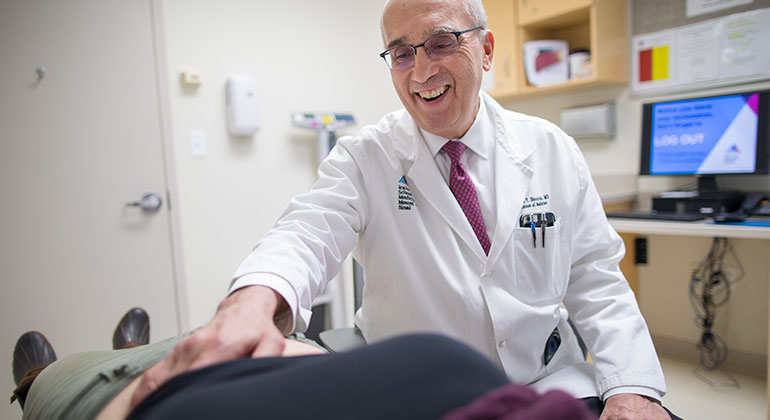General Hepatology for Liver Disease

The primary role of the liver is to help you digest food, turn food into energy, and remove toxins from your blood. While disease, excessive drinking, and obesity can damage your liver, it is a resilient organ, and it can heal with proper treatment. However, if liver damage is untreated, over time it can cause scarring (cirrhosis) and lead to liver failure.
Symptoms of Liver Disease
You should make an appointment to see one of our general hepatologists if you have any of these symptoms:
- Abdominal pain and swelling
- Chronic fatigue
- Dark urine
- Loss of appetite
- Nausea or vomiting
- Swelling in legs or ankles
- Yellow eyes or skin
If left untreated, your symptoms can worsen over time. Our general hepatologists may treat you or refer you to one of our other specialists at Mount Sinai.
Liver Diseases and Conditions
Liver specialists (hepatologists) at the Mount Sinai Health System provide comprehensive evaluation, assessment, and treatment for a wide range of liver diseases and conditions. The most common include: (These should link to their respective subpages)
- Viral Hepatitis, including Hepatitis B and Hepatitis C
- Auto Immune Liver Disease
- Bile Duct Diseases
- Drug-Induced Liver Injury
- HIV and Hepatitis C (HCV)
- Liver Cancers
- Nonalcoholic Fatty Liver Disease
In addition to these diseases, the hepatologists at Mount Sinai are also experts in treating:
Cirrhosis of the Liver
Chronic diseases of the liver advance over time and can build-up scar tissue in the liver as the liver tries to heal itself from repeated damage. This cycle of scar tissue accumulation (fibrosis) may lead to the development of cirrhosis. Cirrhosis blocks blood flow to the liver, causing possible liver failure. In cases of liver failure, you may need liver transplantation.
By treating liver conditions at early stages, we may be able to prevent life-threatening fibrosis so that you may not need transplantation.
Liver Enzyme Deficiency – Hepatic Porphyria
Hepatic porphyria affects the liver.
Porphyria is a group of rare inherited disorders. There are several types of porphyria, and each affects the body differently. Mount Sinai treats all types of porphyria. Hepatic porphyria affects the liver. Our hepatologists recommend liver function tests annually if you have a diagnosis of porphyria or it is suspected.
Porphyria disorders affect the heme -- an important part of red blood cells (hemoglobin) that carry oxygen throughout the body. Heme forms in bone marrow and the liver with the help of certain enzymes. A shortage of enzymes affects the heme, causing substances (porphyrins) to build up in various tissues of the body. Build-up of porphyrins can cause severe skin, abdominal, or neurologic symptoms depending on the type of porphyria.
While the enzyme deficiency is usually inherited, other factors — drugs and diet, for example — can contribute to the severity of the condition. To treat you, Mount Sinai hepatologist, Amreen Dinani, MD works collaboratively with our Porphyria Comprehensive Diagnostic and Treatment Center to manage porphyrias that may involve the liver. Our program provides outpatient and inpatient care based on your condition and type of treatment you need.
In addition, we have ongoing porphyria clinical trials. Ask your doctor about possible participation.
To ensure that you are getting the most effective and current care, Mount Sinai also works closely with the Porphyria Foundation and the Porphyrias Consortium.
Liver Disease in Women
Liver disease in women can be complicated, particularly during pregnancy. At Mount Sinai, we have experts who specialize in caring for women with liver disease that first occurs during pregnancy, or who have had abnormal liver tests. For women with chronic liver disease, we also provide treatment during pregnancy and post-delivery. Liver disease includes hepatitis B, hepatitis C, fatty liver disease, and autoimmune hepatitis.
Mount Sinai hepatology specialist, Tatyana Kushner, MD, works closely with the obstetrical team to ensure proper management of liver disease before, during, and after your baby is born. In this team-centered approach with obstetricians, we provide care to women with even the most complex liver diseases such as cirrhosis.
Mount Sinai also specializes in providing care to women of all ages who experience polycystic ovarian syndrome (PCOS), menopause, and other conditions, which have hormonal influences on the course and severity of liver disease.
At Mount Sinai, we care for women with all types of liver diseases. To make an appointment, call us at 212-659-8557.
Treating All Ages
Our physicians bring vast experience to the diagnosis, evaluation, and treatment of adults with liver disease. We also offer liver care for children and adolescents with liver disease.
Mount Sinai has been at the forefront of many of the clinical trials that have led to advances in the treatment of liver diseases caused either by viruses, genetics, or other factors such as excessive drinking or obesity. Our specialists tailor your treatment plan to provide individual care, with the goal of stopping or slowing the disease so that you can continue to lead an active life.